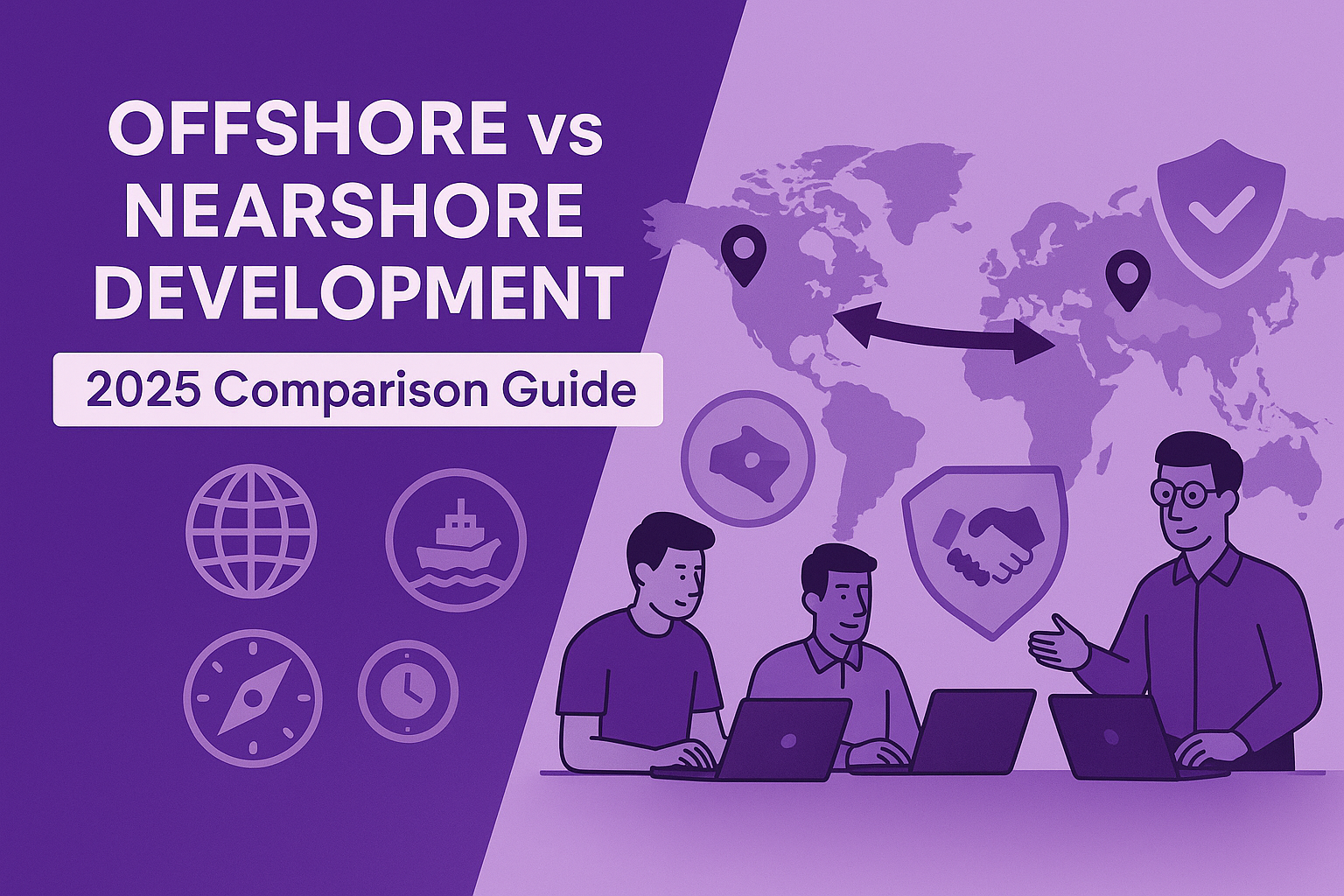TL;DR: Key Takeaways
- Nearshore staff augmentation provides 40-50% cost savings vs Western European rates while maintaining cultural compatibility and timezone alignment
- Bulgaria's advantages: 1-2 hour time difference from Western Europe, EU membership, strong English proficiency, €25-49/hour rates
- Best for: Western European companies needing flexible development capacity with minimal communication barriers
- Bottom line: Nearshore combines offshore cost benefits with onshore collaboration ease - a perfect middle ground for EU companies
What is Nearshore Staff Augmentation?
Nearshore staff augmentation is a hiring model where companies augment their development teams with external professionals from nearby countries that share similar time zones, cultural values, and business practices. Unlike offshore outsourcing to distant regions like Asia, nearshore partnerships maintain geographical proximity while delivering significant cost advantages over domestic hiring.
Key characteristics:
- Geographic proximity: Located within 1-3 time zones of your headquarters
- Cultural alignment: Shared European business culture and work ethics
- Real-time collaboration: Overlapping work hours enable synchronous communication
- EU compliance: GDPR-compliant operations and standardized legal frameworks
- Cost efficiency: 40-50% savings compared to Western European domestic rates
For Western European companies, Eastern European countries—particularly Bulgaria, Romania, and Poland—represent ideal nearshore destinations. These markets offer the technical expertise of Western Europe at significantly lower costs, without the communication challenges typical of Asian offshore arrangements.
Why Bulgaria is the Optimal Nearshore Location
Geographic and Timezone Advantages
Bulgaria operates on GMT+2, providing perfect timezone alignment with Western European business operations:
- 1 hour ahead of Central Europe (Germany, France, Netherlands)
- 2 hours ahead of UK and Portugal
- Same working hours as Scandinavia during summer
- Complete overlap with standard 9-5 European business hours
This proximity enables real-time collaboration through daily standups, instant messaging, and video calls during normal working hours—impossible with Asian offshore teams requiring overnight coordination.
EU Membership and Compliance Benefits
As an EU member since 2007, Bulgaria provides critical advantages for European companies:
GDPR compliance: Full alignment with European data protection regulations eliminates compliance risks associated with non-EU outsourcing destinations.
Legal framework compatibility: Standardized contract law, IP protection, and business regulations simplify vendor relationships and reduce legal complexity.
Banking integration: SEPA transfers, EU invoicing standards, and familiar financial infrastructure streamline payment processing.
Cultural and Professional Compatibility
Bulgarian developers integrate seamlessly with Western European teams:
Strong English proficiency: Average English level comparable to the Netherlands and Scandinavian professionals, far exceeding Asian offshore alternatives.
European work culture: Familiar business etiquette, communication styles, and professional expectations eliminate cultural friction.
Technical education: Robust computer science programs produce 5,000+ software engineering graduates annually with strong theoretical foundations.
ISTQB certification prevalence: High adoption of international testing standards ensures quality-focused development practices.
Nearshore vs Offshore vs Onshore: Cost Comparison
Understanding the true cost difference across engagement models:
Onshore (Western Europe) Rates:
- Junior developers: €50-70/hour
- Mid-level engineers: €65-90/hour
- Senior developers: €80-120/hour
- Average project cost: €100,000-200,000 (6 months, 3 developers)
Nearshore (Bulgaria) Rates:
- Junior developers: €20-35/hour
- Mid-level engineers: €30-45/hour
- Senior developers: €40-60/hour
- Average project cost: €45,000-85,000 (6 months, 3 developers)
Offshore (Asia) Rates:
- Junior developers: €15-30/hour
- Mid-level engineers: €25-40/hour
- Senior developers: €35-55/hour
- Average project cost: €40,000-75,000 (6 months, 3 developers)
The nearshore advantage: While offshore Asia offers 5-10% additional savings, nearshore Bulgaria eliminates communication delays, timezone conflicts, and cultural misalignments—hidden costs that often exceed apparent savings.
Benefits of Nearshore Staff Augmentation for Western European Companies
Seamless Communication and Collaboration
Real-time availability during European business hours enables:
- Daily standup meetings without overnight scheduling
- Instant problem resolution through synchronous messaging
- Natural sprint planning and retrospective participation
- Video calls during normal working hours for all parties
Western European companies report 40-60% faster decision-making with nearshore teams versus offshore arrangements requiring asynchronous communication.
Reduced Travel Requirements
Geographic proximity makes face-to-face collaboration practical:
- 2-3 hour flights from major European hubs to Sofia
- Budget airline accessibility (Ryanair, Wizz Air) reduces travel costs
- Quarterly onsite visits are feasible without excessive expense or time investment
- Visa-free travel within the EU simplifies logistics
Quality Without Compromise
Nearshore Bulgaria delivers Western European quality standards:
ISTQB-certified engineers following international testing and quality protocols
Agile methodology adoption matches Western European development practices
Code quality standards aligned with European enterprise requirements
Security compliance meeting stringent European banking and healthcare regulations
Flexibility and Scalability
Nearshore staff augmentation provides operational advantages:
- Scale teams up or down with 30-day notice periods
- Access specialized skills unavailable in domestic markets
- Maintain European employment law protections
- Avoid long-term employment commitments while retaining team stability
When Nearshore Staff Augmentation Makes Sense
Ideal Scenarios
Growing startups scaling beyond local talent pools benefit from immediate access to senior developers without multi-month recruitment cycles.
Enterprise digital transformation initiatives requiring sustained development capacity find that nearshore teams provide consistency without bloating permanent headcount.
Product companies with evolving requirements leverage nearshore flexibility to adjust team composition as priorities shift.
Regulated industries (fintech, healthcare) requiring European data residency and compliance oversight maintain control through nearshore partnerships.
Less Suitable Situations
Projects under 3 months don't justify integration overhead—better suited for project outsourcing.
Highly specialized niche technologies may lack sufficient talent depth in nearshore markets.
Companies that require daily on-site presence for security or workflow reasons cannot accommodate remote nearshore teams.
Why Choose Bulgarian Nearshore Staff Augmentation?
Bulgaria represents the optimal nearshore destination for Western European companies seeking cost efficiency without sacrificing collaboration quality:
Cost advantage: 40-50% savings versus domestic Western European rates
EU compliance: GDPR-aligned operations and standardized legal framework
Timezone alignment: Complete overlap with European business hours
Cultural compatibility: European work culture and strong English proficiency
Technical expertise: ISTQB-certified engineers with modern technology stack experience
Geographic proximity: 2-3 hour flights enable practical face-to-face collaboration
For Western European companies evaluating staff augmentation strategies, nearshore partnerships with Bulgarian providers offer the perfect balance of cost efficiency, collaboration ease, and quality assurance.
Frequently Asked Questions
How does nearshore compare to offshore outsourcing?
Nearshore provides 5-10% higher costs than Asian offshore but eliminates timezone conflicts, cultural barriers, and communication delays—typically delivering better ROI through faster delivery and reduced coordination overhead.
What timezone is Bulgaria in?
GMT+2 (EET), providing 1-2 hour difference from Western Europe with complete business hour overlap for real-time collaboration.
Are Bulgarian developers EU citizens?
Yes. Bulgaria joined the EU in 2007, providing full freedom of movement and standardized employment protections for European companies.
How quickly can nearshore teams start?
Experienced Bulgarian developers typically begin productive work within 1-2 weeks after agreement, including onboarding and integration.





